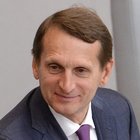During his working visit to France on November 15–16, 2010, Sergei Naryshkin participated in the opening of the Unknown Siberia Russian cultural festival of modern art in Lyon.
The festival is one of Russia’s brightest cultural projects this year in France. Its programme includes concerts, exhibitions about Siberia and its people, meetings with Siberian painters, writers, and other artists.
The objective of the festival is to introduce to Europeans Siberia they do not yet know, Siberia seen through the eyes of the people living there, to bring the peoples of Russia and France closer together and strengthen various Russian-French cultural ties.
In Paris, the Chief of Staff of the Presidential Executive Office participated in a joint final session of the steering committees for the Year of Russia in France and the Year of France in Russia. Sergei Naryshkin described this project as fully successful, both in terms of scale and geography of the events.
At the session, it was proposed to organise a season of Russian language in France and French language in Russia in 2012. The meeting also discussed a project to create a Russian-French film academy, which would allow combining the creative and financial potential of Russian and French cinema.
In addition, Sergei Naryshkin met with his colleague, Secretary General of the Elysee Palace Claude Gueant, and discussed current issues in bilateral relations and cooperation in the international arena. The meeting also addressed Russia’s relations with NATO ahead of the upcoming summits in Lisbon and several issues related to easing the visa regime. Sergei Naryshkin noted that the Russian side stresses these issues in other bilateral meetings, as well as in multilateral formats. Speaking about the meeting, Mr Naryshkin emphasised that French partners also have a fairly active and positive position with regard to Russia’s proposals and initiatives and are ready to decisively move toward considerably simplifying the visa regime and all visa procedures, more easily than other European partners do.
In a separate discussion, the vital, sensitive matter of rights of children born into mixed Russian-French marriages was also raised. First and foremost, this discussion addressed developing a mechanism to resolve such disputes. According to Sergei Naryshkin, work has commenced to draft an intergovernmental agreement to regulate these matters. While the agreement is being prepared, a suggestion was made to create a consultative platform: a commission that would give recommendations or engage in pre-trial resolution of such disputes (the French side responded positively to this suggestion).
